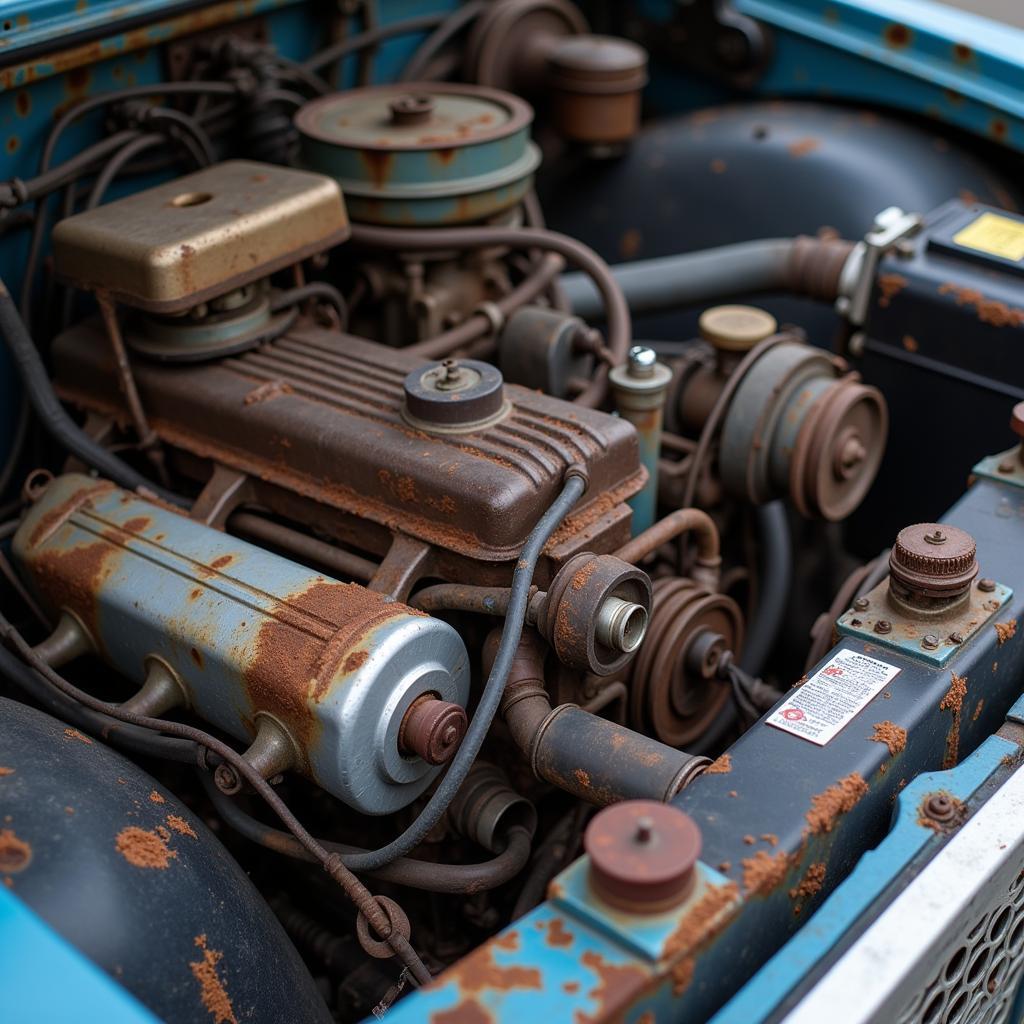Exhaust leaks are a common car problem that can lead to decreased performance, reduced fuel efficiency, and even health hazards. Knowing how to identify and fix an exhaust leak is crucial for maintaining your car’s health and your own. This guide will provide you with the knowledge and steps to tackle this issue, whether you’re a DIY enthusiast or prefer to seek professional help.
Exhaust leaks can manifest in various ways, from a subtle ticking sound to a loud roar. A decrease in fuel efficiency, a noticeable smell of exhaust fumes inside the car, and a vibrating gas pedal are also potential indicators. If you suspect a leak, it’s essential to address it promptly. If you are uncertain about any of these steps, don’t hesitate to consult a professional. Sometimes, the problem might seem straightforward, but underlying issues could exist. Remember, safety and proper car maintenance are always paramount. If your car is showing signs of starting problems in addition to the exhaust leak, you can find helpful information at how much does fixing a car starter cost.
Pinpointing the Leak: Where is that Noise Coming From?
Locating the leak is the first step in Fixing An Exhaust Leak In Your Car. A visual inspection is often sufficient to identify obvious holes or cracks. Start by checking the exhaust manifold, pipes, muffler, and catalytic converter. Look for signs of rust, damage, or loose connections.
A simple trick to locate smaller leaks is to have someone lightly rev the engine while you listen for the hissing sound of escaping exhaust gases. You can also use a piece of cardboard or a rag to carefully feel for escaping air around the exhaust system components. Remember to be cautious and avoid touching hot parts.
DIY Fixes: Patching Up Minor Exhaust Leaks
Minor exhaust leaks can sometimes be temporarily fixed with specialized exhaust repair tape or paste. These products are readily available at most auto parts stores. Ensure the engine is cool before applying the patch, and follow the product instructions carefully. Remember, these fixes are usually temporary and should be followed up by a more permanent solution.
When to Call in the Pros: Knowing Your Limits
While minor leaks can be addressed with DIY solutions, more complex issues require professional attention. If the leak is extensive, located in a hard-to-reach area, or involves damaged components, it’s best to take your car to a qualified mechanic. They have the expertise and tools to diagnose and fix the problem correctly. If you’re considering professional help for a broken car window too, check out where to get a broken car window fixed.
Preventing Future Exhaust Leaks: Keeping Your System Healthy
Regular maintenance is key to preventing future exhaust leaks. Ensure your car undergoes routine inspections, and address any rust or damage promptly. Protecting your exhaust system from the elements can also extend its lifespan.
Cost Considerations: How Much Will it Set You Back?
The cost of fixing an exhaust leak in your car varies depending on the severity of the damage and the labor costs in your area. A simple patch can cost a few dollars, while replacing a major component like the catalytic converter can be significantly more expensive. If you are dealing with car starter issues as well and are curious about the costs involved, have a look at car starter fix cost. It’s always a good idea to get multiple quotes from reputable mechanics before making a decision.
Fixing an Exhaust Leak: The Long-Term Solution
Fixing an exhaust leak involves replacing the damaged component or section of the exhaust system. This could include the exhaust manifold, pipes, muffler, or catalytic converter. A professional mechanic will be able to accurately diagnose the problem and recommend the appropriate repair. They might also suggest additional repairs if other components are showing signs of wear and tear. For example, if your car requires extensive work, you might find our article about car restoration helpful: car fix trans am part 2.
Quote from John Smith, ASE Certified Master Technician: “Ignoring an exhaust leak can lead to more serious problems down the road. Addressing it promptly can save you money and headaches in the long run.”
Quote from Jane Doe, Automotive Engineer: “Modern exhaust systems are complex. While some minor repairs can be done at home, it’s often best to consult a professional for anything beyond a simple patch.”
Fixing an exhaust leak in your car is crucial for maintaining its performance, fuel efficiency, and your own safety. By understanding the signs of a leak, knowing how to locate it, and choosing the right repair method, you can keep your car running smoothly and safely. Contact AutoTipPro at +1 (641) 206-8880 or visit our office at 500 N St Mary’s St, San Antonio, TX 78205, United States for any assistance. Don’t hesitate to reach out – we’re here to help! In case you’ve encountered issues after incorrectly connecting your car battery, this article might help: how to fix car when hooking batterey up wrong.






Leave a Reply